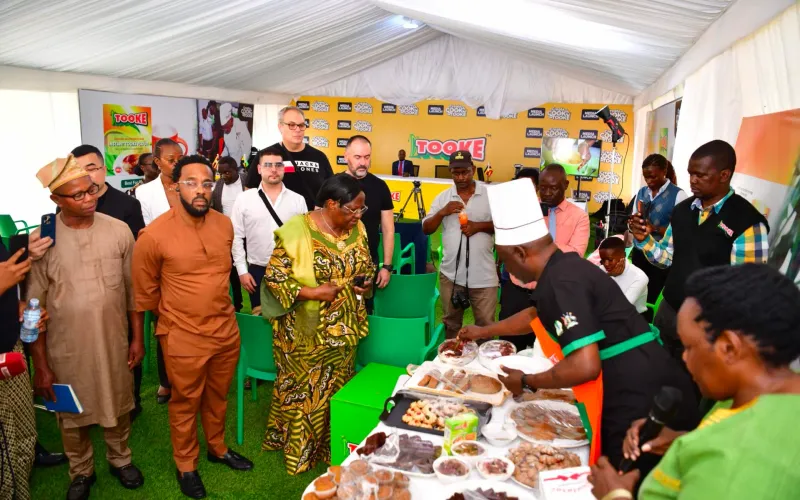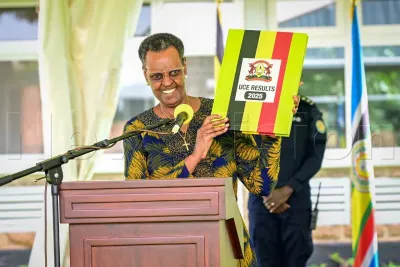
The Tooke brand developed under the Presidential Initiative on Banana Industrial Development (PIBID) and commercialised through the Banana Industrial Research and Development Centre (BIRDC) has now fully transitioned into the commercial market.
According to the initiative’s chief scientist and innovator, DrFlorence Muranga, demand for the product is rising rapidly, particularly in Europe. After extensive testing in both domestic and international markets, she says the team is now scaling up production and broadening the product range to meet this growing interest.
Prof Muranga notes that, with the planned increase in output, Tooke flour has the potential to dominate Uganda’s local market and cut down the USD 500 million spent each year on wheat imports. It could also contribute significantly to export revenues.
She explains that although farmers invest heavily in cultivating matooke, the returns are modest compared to the value of processed products. A single, medium-sized bunch typically sold at 30,000 Shillings can yield roughly four kilograms of Tooke flour. Each kilogram fetches USD 13 (47,000 Shillings), bringing in more than 180,000 Shillings, especially in markets such as the UK and broader Europe.
Prof Muranga adds that international consumers have embraced Tooke products more quickly than Ugandans, largely due to the flour’s nutritional profile. Tooke flour, she says, is a science-backed, gluten-free option high in fibre and low in carbohydrates. She contrasts this with wheat, which she associates with elevated risks of hypertension and some cancers.
The Tooke initiative was established in 2005 by President Museveni after Muranga demonstrated the feasibility of processing bananas on an industrial scale. The product has since satisfied both domestic and international quality requirements.
Today, Tooke flour is incorporated into bread, cakes, biscuits, baby foods and an expanding assortment of value-added items. The project is now sharpening its market strategy and engaging potential distributors and franchise partners. Muranga made these remarks during the launch of the “Create and Cook with Tooke” competition, aimed at highlighting the versatility of banana-based innovations.
Running from January to March 2026, the competition will attract bakers, chefs and culinary creatives. “Subsequently, we have commenced to welcome entries from interested individual chefs and bakers. Winners will be crowned during a Grand Finale dinner in April 2026, which will also mark the 21st Anniversary of PIBID,” Muranga said.
Participation is open to experienced professionals, bakers and pastry chefs with at least five years in the field, and general chefs with no fewer than three years. Contestants will receive training before progressing through qualifying, semifinal and final rounds. Judges will assess taste, creativity, presentation and, most importantly, the innovative use of Tooke flour. The top three performers in each category will be awarded free online marketing opportunities.
Although the journey to commercial maturity has been long, Muranga says the impact is already evident. “It is noteworthy that the successful transition of the banana value addition initiative from research to commercialisation has helped to increase incomes, create employment, diversify and improve food security, as well as expand markets both local and international,” she said.
She emphasises that Tooke flour is a gluten-free slow-digesting starch (SDS) rich in resistant starch, attributes increasingly sought after in health-conscious markets. The competition, she adds, will help identify expert chefs who can train others and advance Tooke’s visibility across regional and global markets.
To support this growth, PIBID has established a 24-acre mother garden containing 52 banana varieties at its Bushenyi pilot plant. It has also upgraded the formerly rundown Nyaruzinga District Farm Institute into a Technology Business Incubator and built a facility dedicated to research, training and processing.
Future expansion includes setting up production units at the 640-acre Ishara Industrial Technology Park. The goal is to lift current daily output from 1.4 tonnes of dry banana flour to between 10 and 14 tonnes while widening into fish and livestock feed production.
Bagonza, a member of the Presidential Advisory Committee on Exports and Industrial Development (PACEID), believes that adding value to crops like matooke and coffee can greatly enhance Uganda’s foreign exchange earnings. He notes that Tooke flour has become increasingly popular abroad, with particularly strong traction in the UK, where consumers are recognising banana flour as a healthier wheat alternative.
During a recent event in Arusha, Gideon Maitha Mung’aro, Governor of Kenya’s Kilifi County, remarked that Tooke is poised to transform food markets in countries that consume large quantities of flour-based foods.
Uganda’s banana innovations have already been recognised regionally: Tooke recently received the East Africa Quality Awards “Platinum Winner” title for the “Most Preferred Baking Banana Flour.”
Bananas remain central to Ugandan agriculture grown by 75 per cent of farmers and contributing to the world’s highest per capita banana consumption at 220–400 kg annually, according to the UNDP. The country produces more than six million tonnes of bananas each year, with 70 per cent consumed locally.
Entrepreneurs are also discovering new avenues in banana by-products. Hellen Munyasa, CEO of Helton Traders, says the future lies in diversifying into both food and non-food items such as fibres for sewing threads, an area in line with Tooke’s wider innovation agenda. She adds that franchises and production partnerships offer Ugandans a chance to boost their incomes through commission-based opportunities.
Data from the World Integrated Trade Solution shows that Uganda exported USD 6,355 worth of bananas including plantains, fresh or dried in 2023, amounting to 9,500 tons. Dry banana flour is used in a broad range of products, from ice cream and puddings to cereals, biscuits, cakes, crispbreads, flavourings and colourings.
On the global stage, Ecuador leads banana-product exports with a 28.68 per cent market share and USD 3.65 billion in earnings, followed by the Philippines with USD 1.22 billion and Costa Rica with USD 1.19 billion.













Roswell Mbabazi
Leave a Comment
Your email address will not be published.